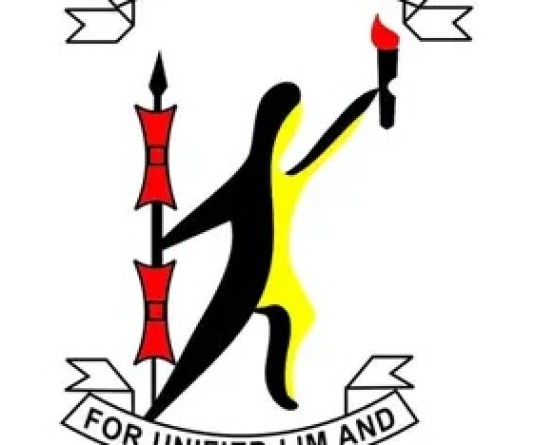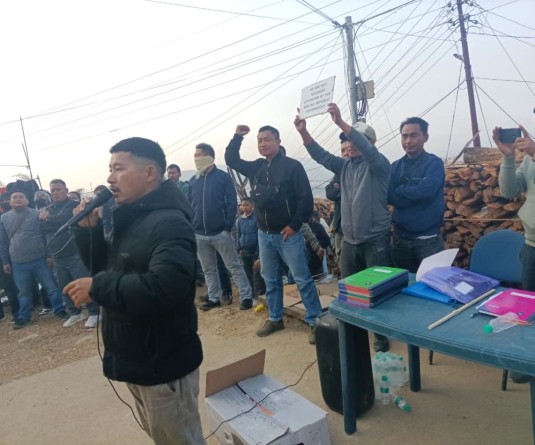
(Left): Men folk marching toward Pfuki Peak to mark the end of the Chithunih festival (Right): Women folk returning back from Pkuki Peak after marking the end of the Chithunih festival.
Kohima, January 6 (MExN): Mao Nagas has celebrated Chithunih festival which literary means ‘the festival of the new year’. In popular parlance, Chithunih heralds the beginning of the new and passing of the old. The first day of the festival is known as Nisha. In sense, it is the preparatory day of the festival. The main feast takes place on the second day, known as Niji.
The third day, called Oshu Kope, is important in terms of various ceremonies and other social practices. All the men folk proceed to cover their own land together to the outskirts of the village for chasing bird early morning on this day. Later, the people gather and left for home by hanging the birds on tree branches which they have catches during the rites, voicing the sounds of festive howling. The third day of the festival is also considered auspicious for those women who are married between the third and the seventh day of Chithunih Khroh. They are invited to the parental home and sent off with many gift.
On the fourth day, irrespective of the day of marriage, all married women are gifted with piece of meat by their respective loving brothers and parents to signify that they all are in their memories. The day is called Oshu Kope Opa.
On the fifth day, which is the last day of Chithunih Khroh (January), festivities go on throughout the day. People eat, drink and merry makings at several places in groups.
On the first day of the following month called Chisiilopra (February), the entire men folk of the village put on traditional attires carry their traditional weapons and take out a long procession to a designated spot on the slope of the western hills to mark the end of the festival.
During the whole course of the procession, people keep going on voicing the sound of festive howling till they reach their destinations. Young women, dressed in their best attires, accompany the men, each carrying a basket, which contains eatable things like fruits, foods, drinks etc.
The rational behind the procession, apart from festive spirit, is traditionally the symbolic assertion that the people are the owners of the entire length and breadth of the land. Upon reaching the destination, various competitive games are played. Youngsters exhibit their prowess and talents through such games.
Chithuni is not only the biggest function but a significantly shows the important aspect of the Mao festival. It is a grateful and joyous celebration of the blessing through their toils and strives. People seek forgiveness from the Almighty God for their wrong doing committed in the past year and pray for good health, bountiful harvest and favourable weather for the years to come.
The third day, called Oshu Kope, is important in terms of various ceremonies and other social practices. All the men folk proceed to cover their own land together to the outskirts of the village for chasing bird early morning on this day. Later, the people gather and left for home by hanging the birds on tree branches which they have catches during the rites, voicing the sounds of festive howling. The third day of the festival is also considered auspicious for those women who are married between the third and the seventh day of Chithunih Khroh. They are invited to the parental home and sent off with many gift.
On the fourth day, irrespective of the day of marriage, all married women are gifted with piece of meat by their respective loving brothers and parents to signify that they all are in their memories. The day is called Oshu Kope Opa.
On the fifth day, which is the last day of Chithunih Khroh (January), festivities go on throughout the day. People eat, drink and merry makings at several places in groups.
On the first day of the following month called Chisiilopra (February), the entire men folk of the village put on traditional attires carry their traditional weapons and take out a long procession to a designated spot on the slope of the western hills to mark the end of the festival.
During the whole course of the procession, people keep going on voicing the sound of festive howling till they reach their destinations. Young women, dressed in their best attires, accompany the men, each carrying a basket, which contains eatable things like fruits, foods, drinks etc.
The rational behind the procession, apart from festive spirit, is traditionally the symbolic assertion that the people are the owners of the entire length and breadth of the land. Upon reaching the destination, various competitive games are played. Youngsters exhibit their prowess and talents through such games.
Chithuni is not only the biggest function but a significantly shows the important aspect of the Mao festival. It is a grateful and joyous celebration of the blessing through their toils and strives. People seek forgiveness from the Almighty God for their wrong doing committed in the past year and pray for good health, bountiful harvest and favourable weather for the years to come.






